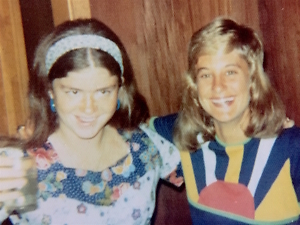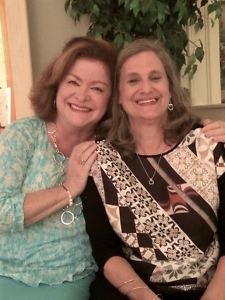The Conversation That Continues
An old friend is the best friend
The first time I saw Jane, she was sitting alone in the bleachers, a row or two above and to the side of my little cluster of friends as we waited for the pep rally to start. It was the fall of 1970, and we were freshmen in high school, that tender, socially feverish age when your friendships are everything and time stands still around every relationship.
 She had a haircut that was very fashionable in those days—I forget what we called it, but it featured bangs and fringe around the sides and back, and to my eyes it looked terribly chic. I admired her trendy outfit and wondered why she sat by herself. Someone said she was new, just moved to town, so I guessed she didn’t know anyone.
She had a haircut that was very fashionable in those days—I forget what we called it, but it featured bangs and fringe around the sides and back, and to my eyes it looked terribly chic. I admired her trendy outfit and wondered why she sat by herself. Someone said she was new, just moved to town, so I guessed she didn’t know anyone.
I can’t recall our first verbal exchange in exact detail, but it occurred in the crowded, noisy girls’ locker room after gym class, where her assigned locker was just above mine on the long green metal rows of clanging doors and clattering locks. In the inevitable jostling to clean up, dress, and get to the next class while holding one’s own in the constant drumbeat of high-school gossip, I stepped on her shoe or knocked over her books or did something that required me to apologize in embarrassment. She laughed it off, and a conversation began. It wasn’t long before we became the best of pals, endlessly carrying on about fashion, love, family, the state of the world, and the things that worried us.
As fourteen-year-old best friends who embarked together on growing up, we were pretty tame operators, lucky girls who were loved and secure in our families, largely oblivious, for better or worse, to the radical winds blowing everywhere during those tumultuous times.
I got a haircut like hers (hers looked far better), we vacationed with each other’s families, and we thought ourselves unbearably hip when tooling around in her father’s convertible. On one memorable double date, we suffered the shared humiliation of jolting our boyfriends into uproarious laughter when they spied our matching midriff tops and hip-hugger jeans. She cheered when I was elected vice president of the class, and I clapped and whooped at her drill corps performances.
After graduation, her family relocated to the Northeast, a move brought about by her father’s ascension to leadership at a major corporation. We hugged and sobbed the day she left, and I watched them all drive away, envisioning Jane’s elegant new life near alluring New York City, her family summer home on the beautiful lake in northern Michigan, her admission to an Ivy League school. I planned to start at the state university in the fall and fill my summer days with work in the hometown retail store. Some people have all the luck. I simmered with teen petulance, experiencing searing jealousy for the first time in my young life, too green and self-centered to appreciate my own blessings. It seemed certain she was leaving me behind.
But she didn’t.
 The years rolled by, and in some ways it seemed our lives would grow worlds apart. In the season of youth marked by life-altering choices, we made very different ones. I stood up with her at her wedding, celebrating a marriage to a bright and caring man with a great future ahead of him, her intellectual equal and partner. Against the advice of my parents and nearly everyone I knew, I married a man I shouldn’t have, and with some deep-seated instinct I couldn’t explain, even to myself, I didn’t invite her to the wedding. If the omission stung, she never acknowledged it.
The years rolled by, and in some ways it seemed our lives would grow worlds apart. In the season of youth marked by life-altering choices, we made very different ones. I stood up with her at her wedding, celebrating a marriage to a bright and caring man with a great future ahead of him, her intellectual equal and partner. Against the advice of my parents and nearly everyone I knew, I married a man I shouldn’t have, and with some deep-seated instinct I couldn’t explain, even to myself, I didn’t invite her to the wedding. If the omission stung, she never acknowledged it.
Alone at Christmas a year or two after the painful divorce that followed as surely as night after day, I was invited to spend the holiday with Jane’s family. Her young daughter proudly presented me with a pencil holder, fashioned from a jar with a carefully drawn Santa figure taped to its neck. Alone in my room later that night, I held the holiday artwork and cried, missing my own daughter and the life I thought I was going to have.
Through those years of marriages, young children, divergent careers, and endless transitions, we somehow managed to cover many miles and experiences together. Looking back, I’m amazed we managed it; yet somehow, every year or two, we turned up somewhere together, continuing a conversation that seemed like it began only the day before. There was my first Broadway musical in New York, a road tour of Vermont in the fall, a series of high-school reunions, and a return to the lake in Michigan when her children were nearly as old as we were when we first met.
From the years when all horizons are new, and time has no limits, we have now arrived at the season when loss becomes part of living and loving, and life mercifully demonstrates that our similarities tower over our differences. When my beloved younger sister was taken by breast cancer at a very young age, Jane called to ask what she could do. “Come see me,” I said, and she did.
Recently, we rendezvoused on a lovely island off the coast of Florida to visit her parents, who have treated me like one of their own all these years and hold a very special place in my heart. It was a great visit, especially important to me because it seemed clear that her mother’s time was growing short. A relentless series of health problems in recent years, including cancer, cardiac disease, and finally dementia, had changed this witty, energetic, hospitable woman into someone very different than the kind soul who listened to our painful boyfriend stories, encouraged our fashion choices, and allowed us the first sip of bourbon in a safe place under her roof all those years ago. One evening at dinner, the unalterable evidence was especially painful to see.
“I wasn’t sure it would be a good thing for you to see this happen,” Jane said before we parted for bed later that night. I longed to ease her heartache, having walked this journey with my father two years earlier. In my head, I tried briefly for a joke to lighten the moment—because when you’ve been seen together in midriff tops, one would think the store of wisecracks could be unfathomable—but nothing funny came to me.
“Don’t be silly,” I said. “You know I’ve been through this, and I wanted to be here. Truthfully, I’m privileged to be here, to be your friend, and to feel like one of this family.” It was the best I could manage, from the deepest part of my heart, but it made her cry.
Yet during this time of looming shadows, when life can spin you sideways in the work of a moment, little things may show the enduring gifts of kindred spirits. On a shopping spree through the tiny, charming Florida island town on that same trip, we pawed through a sale rack at opposite ends—she in the smaller sizes, me in the not smaller. I pulled a multi-colored, brightly patterned top off the rack and held it up for her review. “This is cute,” I said to her back. “What do you think?” She turned and laughed, and for a split second I thought she was questioning my taste. Actually, she was holding up the very same shirt.

Copyright (c) 2018 by Eve Hutcherson. All rights reserved. Eve Hutcherson first published more than three decades ago as a journalist covering the singular world of Thoroughbred horse racing and has since published on topics ranging from vintage car shows to international healthcare business to church choirs. She lives and works in Nashville and currently focuses on essays about the unexpected side of grandparenting and other mid-life topics.

